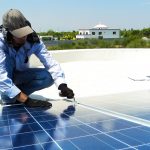Top 5 Energy News Stories This Week (Nov 12th-16th)
Energy is the bedrock of modern existence. It influences world economies and family budgets alike. Given its societal significance, we publish a weekly compendium of energy news and stories that are shaping global markets and affecting daily life.
Natural Gas Prices at a 4-year High
As early cold weather snaps have hit the U.S., natural gas prices hit a four-year high – up 46% since the start of November as the market was caught off guard with the sudden change in weather. As the cold weather continues into December and January, prices could continue to rise as Americans look to heat their homes. Additionally, natural gas storage is 15% below the level one year ago and 16% below the five-year average – a 13-year low for the first week of November at 3,208 Bcf.
Labor Shortage for Permian Pipelines?
The Permain Basin is currently facing a bottleneck issue – lots of shale and gas potential for the region, but a shortage of pipeline infrastructure to move it all. 3,722 wells were drilled but never opened and that number is speculated to rise as high as 7,000 if the shortage continues. One of the main issues facing the industry is labor; there are not enough qualified candidates to fill the hundreds of pipeline workers that will be needed once the pipes are ready.
Hawaii DOT installs solar panels at Daniel K. Inouye Airport
The Hawaii Department of Transportation has installed 4,260 solar panels on the seventh floor of Terminal 1 parking garage at the Daniel K. Inouye Airport. Not only will the new solar panels help capture solar energy to be used by the airport, the “solar canopy” offers airport guests a newly shaded parking area. Construction is to continue at the start of the new year, where an additional 3,000 solar panels will be installed. Hawaii’s airports are also taking step to conserve energy by replacing almost 100,000 light fixtures, upgrading ventilation and air-conditioning systems, and installing more than 24,000 solar panels. The contract with Johnson Controls is expected to generate more than $600 million in cost savings for consumers over the 20 years.
Energy Conservation Tips for this Winter
Recently released, “A Citizen’s Guide to Reducing Energy Waste” outlines how households can reduce energy usage up to 40 to 60% current levels. Checking to make sure your basements, chimneys and attics are well insulated top the list for helping reduce the energy required to maintain a comfortable temperature in your home. Ensuring windows are caulked and weather-stripped is another simple way to prevent air from escaping your home. When washing dishes this holiday season, skip the heated dry option and let your dishes air dry.


